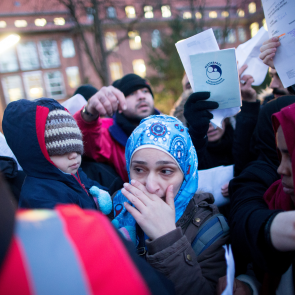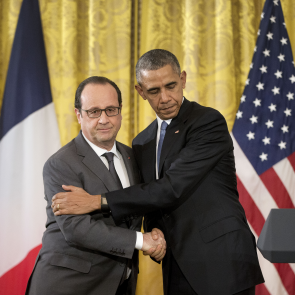"Sectarianism involves strong feelings, deep resentment, a searing sense of injustice, above all, anger," explained renowned British social anthropologist Mary Douglas in an important lecture, Seeing Everything in Black and White, delivered shortly before her death in May 2007.
She added: "All of these are intensified when religious loyalty is engaged."
It's hard to disagree with Douglas's analysis of the sectarian vision – in particular, she must be commended for highlighting the importance of how, under certain circumstances, combining religious belief with powerful emotions, can fuel and give impetus to terrorism.
Now, after the Isis attack in St Denis, Paris in which 130 people died, the Al-Qaeda slaughter of at least 21 people by gunmen at a hotel in Bamako, the Malian capital, and another 22 in a Boko Haram-inspired suicide bombing of Shia Muslims near the Nigerian city of Kano, political commentators and the rest of the population are once again struggling to come to terms with what's happening and why.
So let's go back to Douglas and review what she had to say about such militant religious groups.
Probably the most important point that Douglas makes concerns the "wall of virtue" constructed by those in the sect. Behind it members can look outwards at other people and classify them as different sorts of human beings – in short, "people not like us".
Of course, such a classification system doesn’t necessarily lead to conflict or violence – there are plenty of pacifist religious sects in Western and other societies (Amish, Quakers or Swami Narayan) which classify other people as (more or less) metaphysically inferior and place huge restrictions on the number and type of transactions (sharing or exchanging food, handshakes, or daughters and sons) between members and non-members – but in certain circumstances it does.

Any 'sect' that creates a wall of virtue does not automatically become violent - there are plenty of pacifist examples, like the Amish in America (PA)
"In the extreme case, insiders are saints and outsiders shunned as sinners," explained Douglas. "Inside is white; outside is black … A wall of virtue keeps the two apart, the saints refuse to have anything to do with the outsiders. There can be no negotiation and the word ‘compromise’ means betrayal."
Unfortunately, in jihadi-like sects violence against outsiders is key to demonstrating loyalty to the in-group.
Along with another British anthropologist Edmund Leach, who also provided a seminal analysis of terrorism in his 1977 Munro lectures, Custom, Law and Terrorist Violence, Douglas believes that all such pious enclaves eventually end up squabbling and splitting. Why? Partly because humans the world over are a contrary lot, but mainly because those in positions of authority within the enclave live in constant fear of defectors, who might challenge their dominance and control.
As we know from the example of the history of the Official IRA and the Provisional IRA (and the latter’s many splinter groups) there is a good deal of truth in this perspective.
Although it was not her primary focus, Douglas's analysis can be extended to the terrorist cell itself – the small, sometimes closely, sometimes loosely affiliated, satellite group to the main group, which in the name of global jihad has carried out attacks on ordinary people going about their everyday business.
MORE NEWS, MORE ANALYSIS IN THE TABLET...
Read full analysis and comment on all the latest stories in this week’s print edition of The Tablet. To subscribe click here
Within such a micro-enclave, I suggest, there is little or no time for conflict – either social or ideological – to develop simply because this type of group is often put together relatively quickly and is so specific in its aims or ambitions. And, as the Paris attack in particular demonstrates, secrecy surrounding the operation is generated if strong ties of kinship (rather than weaker ties of friendship) are involved and mobilised. Loyalty to the group is then virtually guaranteed.
But countries affected by terrorist outrages should be wary not to replace their own pluralistic, open worldview with one that is binary. That would simply mirror the worldview propagated by the extremists. More specifically, Western political leaders, such as François Hollande, ought to be very careful in issuing a declaration of "war" because in doing so they are dancing to Isis’s tune.
In fact, the problem that Hollande and his allies, including UK prime minister David Cameron, are making for themselves is that by bonding in the cause of war they are not so much walking but running into a quagmire. It seems almost certain that if Isis in Syria is targeted by UK air strikes then revenge attacks on the UK mainland similar to those in Paris will follow.
 Political legitimacy for bombing Syria will depend on how the electorate ultimately views the decision (PA)
Political legitimacy for bombing Syria will depend on how the electorate ultimately views the decision (PA)
Which raises an interesting question: who will be blamed, both in the short and long-term, for the mayhem that follows: Isis or the UK government? Political legitimacy for Cameron and his would-be Conservative Party successors will obviously depend on the electorate's calculation as to who is at fault.
Moreover, it’s apparent that if Isis really is to be contained or destroyed the US, UK and France will be obliged to forget about immediate regime change in Syria and form some sort of accommodation with President Bashar al-Assad's Shia-dominated army as a precursor to a settlement between the country's three dominant groups, the Alawite Shias, Sunnis and Kurds.
What else can be done? The Isis enclave operates in many ways within a much larger complex social, cultural and political entity, which makes finding a solution extraordinarily difficult, especially in the wider Muslim world where there is intense and increasing competition between Shia and Sunni for theological supremacy and social dominance. So no prize for suggesting new forms of international diplomacy and regional and political representation are urgently needed to create some sort of stability.
But it is surely also right that to solve a transnational problem like the recent spate of terrorist attacks in Bamako, Kano, Paris and elsewhere black-and-white religious thinking, underpinned as Mary Douglas pointed out by closed, supporting groups and institutions, must give way to shades of grey.
Only then can the wall of virtue separating saints and sinners be dismantled.
Dr Sean Carey is a social anthropologist in Honorary Senior Research Fellow in the School of Social Sciences, University of Manchester
KEEP UP TO DATE ON TWITTER AND FACEBOOK...
Follow all the latest news and events from the Catholic world via The Tablet's Twitter feed @the_tablet
Or you can join in the debate at our community page on Facebook




 Loading ...
Loading ...
What do you think?
You can post as a subscriber user ...
User comments (1)
Cardinal Nichols is reported on the Tablet website as 'backing military action' in Syria. One cannot be sure how fairly his views are represented in a short news item, but his remarks appear ill-advised, at the very least, especially on the very day when the specific question of bombing Syria is to be decided. While his reported remarks do not refer specifically to the morality of bombing without further ado, it is unfortunate that, again as reported, he makes no mention of the Church's teaching on just war, and in particular on the requirement that going to war should be undertaken only as a last resort, with a reasonable prospect of justice being achieved, with discrimination as regards harm to civilians, and proportionately (good achieved v harm done). Clearly there can be honest disagreement as to whether these criteria are met over Syria. But for a Church leader not to draw attention to them in a public statement is incomprehensible, and, in today's context, bad religious leadership. Maybe the Cardinal did say these things, in which case it is a great pity the Tablet did not report them, but as things stand it looks to me that the leaders of the Labour Party and the SNP are providing better moral leadership than the Leader of the RC Church in England and Wales.